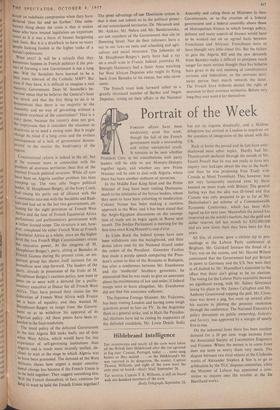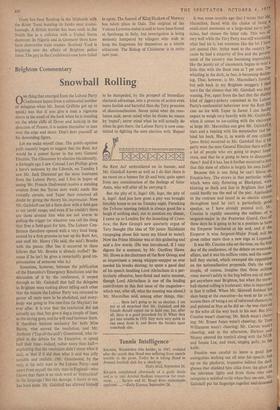Portrait of the Week
In the Middle East King Saud and the Prime Minister of Iraq have been visiting Damascus, much to the jubilation of the Syrian leaders, whom they seem to have been exhorting to moderation. Colonel Nasser has been making a cautious approach to the West, and it has been stated that the Anglo-Egyptian discussions on the resump- tion of trade are to begin' again in Rome next month. The Jordan Parliament is meeting for the first time since King Hussein's coup d'etat.
In Little Rock the federal troops have now been withdrawn into the background, and their duties taken over by the National Guard under the orders of the President. Governor Faubus first made a purple speech comparing the Presi- dent's action to that of the Russians in Budapest, but after a conference between Mr. Eisenhower and the 'moderate' Southern governors, he announced that he was ready to give an assurance about the maintenance of law and order, if federal troops were to leave altogether. Mr. Eisenhower did not find this assurance sufficient.
The Japanese Foreign Minister, Mr. Fujiyama, has been visiting London and having some tough questions posed to him on TV. In the Argentine there is a general strike, and in Haiti the Presiden- tial elections have led to rioting by supporters of the defeated candidate, Mr. Louie Dejoie. India
has cut its exports drastically, and a Maltese delegation has arrived in London to negotiate on the question of integration of the island with the UK.
Back at home the pound and its fate have over- shadowed most other topics. Hardly had Mr. Thorneycroft declared through the mouth of Mr. Enoch Powell that he was not ready to have any inquiry into leakages about the rise in the bank- rate than he was proposing Free Trade with Canada at Mont Tremblant. This, however, was not very favourably received even by those keenest on more trade with Britain. The general feeling was that the idea was ill-timed and that Canada was only prepared to go as far as Mr. Diefenbaker's pet scheme of a Commonwealth Economic Conference, which has been duly signed up for next year. Meanwhile the pound has improved on the world's markets, but the gold and dollar reserves fell last month by $292,000.000 and are now lower than they have been for five years.
All this, of course, gave a certain zip to pro- ceedings at the Labour Party conference at Brighton. Mr. Gaitskell foresaw the threat of a Tory war on the unions, and Mr. Harold Wilson announced that the Government had put Britain in pawn to Germany and the US. Nor were they at all dashed by Mr. Macmillan's statement to the effect that there ain't going to be no election. The voting for the Labour Party executive showed no significant swing, with Mr. Sidney Silverman losing his place to Mr. James Callaghan and Mr. Anthony Greenwood topping the poll. Mr. Cross- man was down a peg, but went up several after his success in piloting the pensions resolution through the conference. The National Executive's policy document on public ownership, Industry and Society, was approved by a margin of nearly five to one.
On the industrial front there has been another demand for a 10 per cent. wage increase from the Associated Society of Locomotive Engineers and Firemen. Where the money is to come from does not seem to worry them very much. The dispute between two rival unions at the Clydeside works of Alexander Stephen & Son is to go to arbitration by the TUC disputes committee, while the Minister of Labour has appointed a com- mittee to inquire into the trouble at the De Havilland works.
There has been flooding in the Midlands with the River Trent bursting its banks near Gains- borough. A British trawler has been sunk in the North Sea in a collision with a United States destroyer. In Nigeria and in Germany there have been destructive train crashes. Scotland Yard is inquiring into the affairs of Brighton police force. The jury in the Confidential case have failed to agree. The funeral of King Haakon of Norway has taken place in Oslo. The original of the Vatican Laocoon statue is said to have been found at Sperlonga in Italy, but investigation is being seriously hampered by villagers who wish to keep the fragments for themselves as a tourist attraction. The Bishop of Chichester is to retire next year.























































 Previous page
Previous page